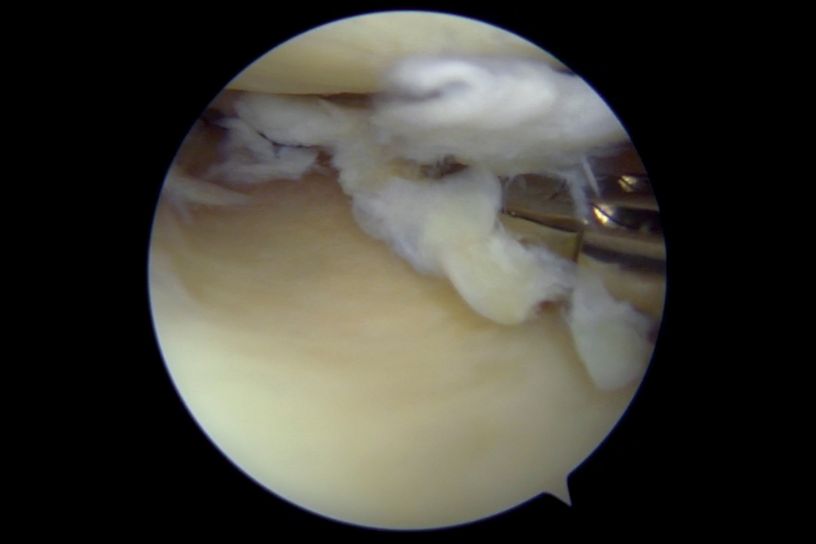Meniscal Tears Treatment
This are common orthopedic concern affecting the knee joint, and their management has seen significant advancements in recent years. Dr. Abhay Chhallani, an expert in the treatment of meniscal tears, sheds light on these vital knee structures and the options available for addressing tears.

Understanding the Menisci:
The menisci, often referred to as the knee's shock absorbers, are vital components of the joint. These structures are composed of fibrocartilage and are ``C``-shaped when viewed from above. The peripheral portions of the menisci are thicker, while the central regions are thinner. In the knee, there are two menisci: the medial meniscus, located on the inner side, and the lateral meniscus, situated on the outer aspect of the knee.
The menisci serve multiple crucial functions. They protect the articular surface of the tibia and assist in the knee's rotation. Moreover, they act as secondary stabilizers, interacting with the ligaments to provide stability to the knee joint. This synergy is most effective when the surrounding ligaments are intact.
Causes of Meniscal Tears:
Meniscal tears are typically the result of trauma, making them one of the most frequently reported knee injuries. Occasionally, tears can also occur in degenerated regions as part of the osteoarthritic process. It's important to note that not all meniscal tears are of equal significance. Some may cause minimal discomfort, while others can result in significant pain and impingement between the lower end of the femur (thigh bone) and the upper end of the tibia (shin bone).
In some cases, meniscal tears can be so extensive that they lead to ``locking`` of the joint. This occurs when the knee is flexed, and the patient is unable to fully extend it. The joint then suddenly ``unlocks`` with a noticeable click or clunk and a sharp, sudden pain. This recurrent locking is a critical diagnostic indicator for significant meniscal tears.
Treatment Options:
The appropriate course of treatment for a meniscal tear depends on several factors, including the type of tear, its location, and its extent. Some tears can be left untreated, while others may require partial or complete resection or repair.
It's worth noting that the way we approach meniscal tear surgery has evolved. In the past, a surgical procedure would involve opening the joint, but today, these surgeries are primarily performed arthroscopically, often referred to as keyhole surgery. This method has brought about significant improvements in patient outcomes. Arthroscopic surgery reduces the associated morbidity, shortens hospitalisation time, and leads to a more efficient post-operative rehabilitation process.
Dr. Abhay Chhallani emphasises the importance of tailoring treatment to each patient's unique circumstances, taking into account the specific characteristics of the meniscal tear and the patient's overall health. With modern advancements in surgical techniques and an understanding of the diverse nature of meniscal tears, patients can expect more successful outcomes and a quicker return to their active lifestyles.
In some cases, meniscal tears can be so extensive that they lead to ``locking`` of the joint. This occurs when the knee is flexed, and the patient is unable to fully extend it. The joint then suddenly ``unlocks`` with a noticeable click or clunk and a sharp, sudden pain. This recurrent locking is a critical diagnostic indicator for significant meniscal tears.
Advantages of Meniscus Tears Surgery:
- Minimally Invasive Approach: Dr. Abhay Chhallani employs a minimally invasive approach using knee arthroscopy for meniscal tears surgery. This technique involves making two small incisions, one for the arthroscope and one for surgical instruments. This minimally invasive approach is known to provide several advantages:
- Rapid Recovery: The keyhole technique used by Dr. Chhallani typically allows for a more rapid recovery compared to open surgical techniques. Because the incisions are smaller and less invasive, patients often experience less pain and discomfort after the procedure. This enables them to get back to their daily activities more quickly.
- Shorter Recovery Times: Patients undergoing meniscal tears surgery with Dr. Chhallani can expect shorter recovery times. Depending on the extent of the meniscal tear and the type of treatment required (repair or trimming), most patients can fully bear weight on the affected knee soon after surgery.
- Personalized Treatment: Dr. Abhay Chhallani assesses each patient’s condition individually to determine the most appropriate treatment approach. Meniscal tears in the zone with a viable blood supply are typically repaired, while those in areas without a blood supply are trimmed. This personalized approach ensures that the patient receives the most suitable treatment for their specific case. Benefits of Meniscal Tears Surgery:
- Pain Relief: Meniscal tears can cause significant pain and discomfort, limiting a person’s ability to engage in daily activities. Surgery performed by Dr. Chhallani can provide effective pain relief by repairing or trimming the damaged meniscus, allowing patients to regain their knee’s function and mobility.
- Improved Knee Function: Surgery for meniscal tears aims to restore the normal function of the knee joint. By addressing the tear and promoting proper healing, patients can experience improved knee function, enabling them to return to their regular activities with confidence.
- Swift Rehabilitation: Rehabilitation is a crucial part of the recovery process, and Dr. Chhallani ensures that patients receive guidance and support from a physiotherapist. With professional assistance, patients can safely and effectively regain strength and flexibility in their knee joint.
- Quick Return to Normal Activities: One of the significant benefits of Dr. Chhallani’s minimally invasive approach is the ability for patients to return to their normal activities relatively quickly. Most patients can get back to work within 1-2 weeks, resume driving, and engage in everyday activities in 4-6 weeks.
In conclusion, meniscal tears surgery performed by Dr. Abhay Chhallani offers numerous advantages and benefits, including a minimally invasive approach, rapid recovery, personalised treatment, pain relief, improved knee function, and a swift return to normal activities. If you are experiencing meniscal tear-related issues, consult with Dr. Chhallani to explore the most suitable treatment options for your condition and get back to a pain-free, active lifestyle.
